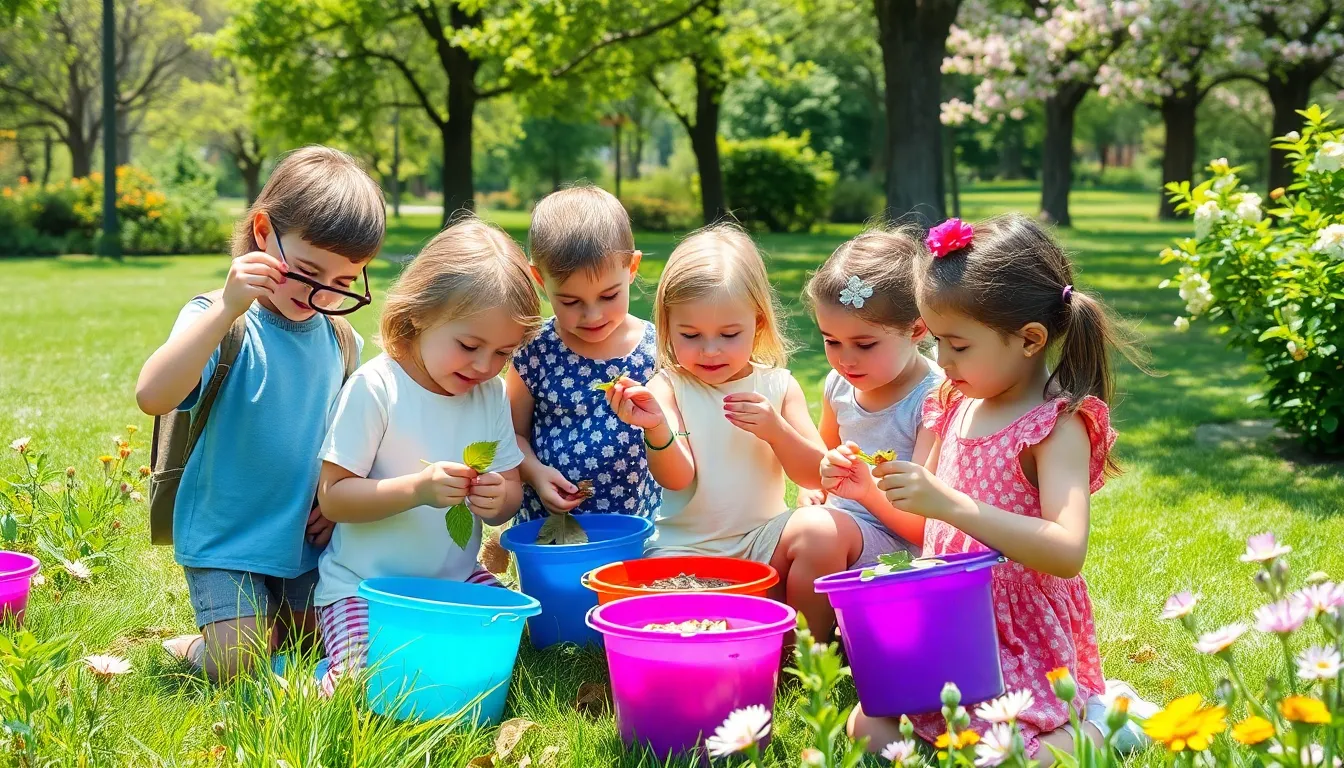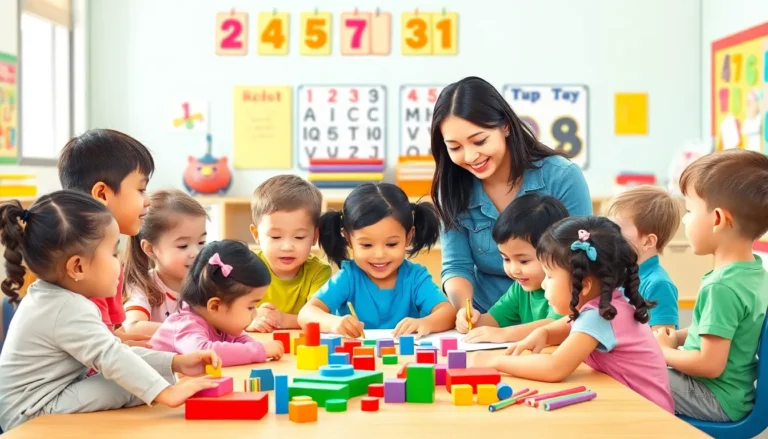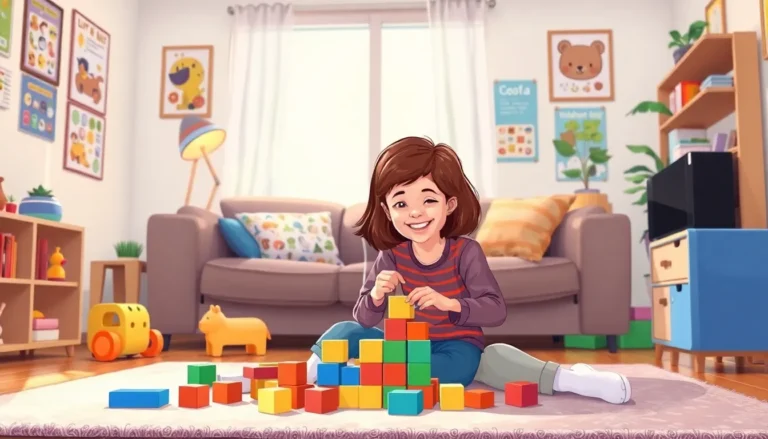Table of Contents
ToggleIn a world where screens dominate playtime, finding creative educational play ideas can feel like searching for a needle in a haystack. But fear not! There’s a treasure trove of activities that not only spark joy but also ignite young minds. Imagine a realm where learning happens while kids are having the time of their lives—yes, it’s possible!
Importance Of Educational Play
Educational play fosters critical skills in children. Engaging in playful activities enhances cognitive development, allowing kids to learn problem-solving and decision-making. Play encourages creativity, promoting imaginative thinking and self-expression. Interaction during play helps children develop social skills by learning cooperation and communication.
Incorporating educational elements into playtime offers various benefits. Research indicates that children who participate in educational play show improved academic performance in areas like math and literacy. Encouraging exploration through play nurtures curiosity, leading to a lifelong love of learning. Activities that combine fun and education stimulate intrinsic motivation, making learning enjoyable.
Parents and educators recognize the value of educational play. Choosing activities that align with children’s interests increases engagement and retention of knowledge. Providing opportunities for hands-on experiences allows kids to learn by doing, reinforcing concepts in a practical context. When children play, they often develop grit and resilience as they face challenges.
Furthermore, educational play contributes to emotional development. Through various scenarios, children learn to navigate their feelings and develop empathy. Cultural awareness grows as they explore diverse narratives and perspectives during play. By participating in cooperative games, children learn conflict resolution skills, preparing them for real-world interactions.
Ultimately, educational play serves as a foundation for holistic development. Prioritizing play that balances learning and fun equips children with essential life skills. This holistic approach ensures that they are not just educated but also well-rounded individuals ready to thrive in society.
Types Of Educational Play Ideas

Educational play activities can be categorized into outdoor and indoor experiences, each offering unique benefits.
Outdoor Play Ideas
Outdoor play fosters exploration and creativity. Nature scavenger hunts encourage kids to identify various plants, insects, and rocks. Gardening projects provide hands-on learning about biology and responsibility. Obstacle courses promote physical fitness while developing coordination and problem-solving abilities. Interactive games, such as tag or capture the flag, enhance teamwork and social skills. Activities like painting rocks or creating nature art stimulate artistic expression and observation.
Indoor Play Ideas
Indoor play encourages imaginative thinking and fine motor skills. Building with blocks or Legos helps develop spatial awareness and engineering skills. Art projects, including drawing, painting, or crafting with recycled materials, foster creativity and self-expression. Cooking simple recipes teaches math, science, and life skills while promoting teamwork. Board games enhance strategic thinking and collaboration. Sensory bins with rice, sand, or water engage children’s senses and support cognitive development.
Benefits Of Educational Play
Educational play offers numerous advantages that contribute to a child’s overall growth and development. Engaging in such activities supports critical skills essential for lifelong learning.
Cognitive Development
Cognitive abilities improve significantly through educational play. Children develop problem-solving skills as they encounter challenges in playful scenarios. Critical thinking thrives in environments that encourage exploration and creativity. Research shows that kids engaged in such play often excel in math and literacy. Hands-on projects reinforce learning concepts effectively, enhancing comprehension and retention. Overall, educational play cultivates a love for learning that extends beyond the classroom.
Social Skills Development
Social skills flourish during educational play experiences. Children learn to cooperate and communicate while participating in group activities. Interaction with peers fosters empathy, teaching them to recognize and manage emotions. Conflict resolution becomes a natural part of their play, enhancing their ability to navigate social situations. Activities that require teamwork help build strong friendships and increase a sense of belonging. Ultimately, these social interactions set the foundation for healthy relationships throughout life.
Tips For Incorporating Educational Play
Select activities that cater to children’s interests to enhance enjoyment and learning. Hands-on projects encourage participation and keep kids engaged. Focus on activities that combine play with core subjects like math and literacy for effective learning experiences.
Incorporate outdoor games to stimulate exploration and creativity. Nature walks, scavenger hunts, and gardening serve as excellent ways to combine fun with education. Prioritize physical fitness and social interaction through team-building exercises and obstacle courses.
Utilize indoor activities to foster imaginative thinking and fine motor skills. Constructing with blocks, engaging in art projects, or cooking together can promote cognitive development. Board games encourage strategic thinking and collaboration, making them valuable educational tools.
Encourage cooperative play to help children learn essential social skills. Group activities enable kids to communicate effectively, develop empathy, and practice conflict resolution. Engaging with peers enhances emotional intelligence and reinforces relationship-building skills.
Integrate routine learning sessions into everyday play. Simple tasks like counting ingredients during cooking or discussing colors while painting help connect educational concepts to daily life. This approach promotes retention and understanding without feeling overly structured.
Observe children as they engage in play. Recognizing their preferences can guide the selection of future activities, fostering a deeper love for learning. Remember, prioritizing educational play greatly supports holistic development and equips children with vital life skills for a successful future.
Embracing educational play is vital for children’s development in today’s screen-centric world. By prioritizing activities that spark curiosity and align with their interests, parents and educators can create engaging learning experiences. These activities not only enhance cognitive and social skills but also foster emotional intelligence and resilience.
Whether through outdoor adventures or indoor creativity, educational play offers endless opportunities for growth. The benefits extend beyond immediate enjoyment, laying a strong foundation for lifelong learning and healthy relationships. Investing time in these playful experiences will undoubtedly equip children with essential skills to navigate their futures successfully.





